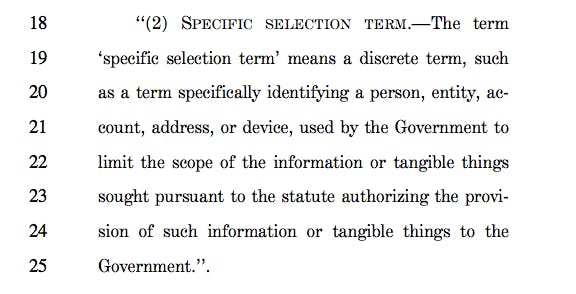Support for a bill considered to be the best chance to reign in mass surviellance by the National Security Agency has completely collapsed.
A new draft of the USA Freedom Act—bipartisan legislation once championed by civil rights activists and major Internet companies alike—includes a “loophole” and “watered-down” language that pushes the bill far short of meaningful reform of NSA operations, say critics, which now includes virtually every major civil liberties group in the U.S.
“This legislation was designed to prohibit bulk collection, but has been made so weak that it fails to adequately protect against mass, untargeted collection of Americans’ private information,” Nuala O’Connor, President and CEO of the Center for Democracy and Technology, said in a statement. “The bill now offers only mild reform and goes against the overwhelming support for definitively ending bulk collection.”
The Electronic Frontier Foundation (EFF) agreed, saying that the latest revisions, crafted in backroom negotiations between House leadership and the Obama administration, “severely weaken the bill, potentially allowing bulk surveillance of records to continue.”
Kevin Bankston, Policy Director of the New America Foundation’s Open Technology Institute, added to the outcry of dissent:
We recognize the need for the USA Freedom Act to move forward now, in order to avoid a worse bill or no bill at all. However, we cannot in good conscience support this weakened version of the bill, where key reforms—especially those intended to end bulk collection and increase transparency—have been substantially watered down.
And Access Senior Policy Counsel Amie Stepanovich said it was “greatly disappointing” that the Freedom Act was “secretly watered down behind closed doors,” which forced the advocacy group to pull its support.
The Reform Government Surveillance Coalition—a group that includes Google, Apple, Yahoo, Microsoft, LinkedIn, AOL, Twitter, and Dropbox—also dropped its support for the Freedom Act, saying in a statement that the latest version has “moved in the wrong direction.”
“The latest draft opens up an unacceptable loophole that could enable the bulk collection of Internet users’ data,” the coalition said. “While it makes important progress, we cannot support this bill as currently drafted and urge Congress to close this loophole to ensure meaningful reform.”
The “loophole” referenced by both the coalition and rights advocacy groups pertains to a modified definition of the “specific selection term,” which determines what data the NSA may legally surveill. Earlier versions of the bill limited the definition to “a term used to uniquely describe a person, entity, or account.” The new version now adds the terms “address” and “device” to the list. It also includes the words “such as,” adding a non-exclusive limit that could allow for broad interpretation.

“Congress has been clear that it wishes to end bulk collection, but given the government’s history of twisted legal interpretations, this language can’t be relied on to protect our freedoms,” says the EFF.
Advocates have also decried the bill’s lack of substantial reform to Section 702 of the Foreign Intelligence Surveillance Amendments (FISA) Act, which allows for the collection of Americans’ communications data under certain circumstances. The new version of the Freedom Act also weakens disclosures allowed by companies, like Google or Facebook, that are required to hand over user information to the government, critics say.
The House is scheduled to vote on the new version of the USA Freedom Act, which has 140 cosponsors, on Thursday, under closed rules, meaning no amendments may be added. It is expected to pass the Republican-controlled House before moving on to the Senate.
Photo via frederic.jacobs/Flickr (CC BY 2.0)


